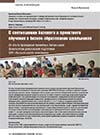On the Relation of Basic and Project Training in Pupils’ Business Education. From the Experience of Project Summer Schools Organized by the Faculty of Pre-University Training of the National Research University Higher School of Economics
DOI: 10.33917/es-6.164.2019.114-121
The article summarizes the experience of a summer project school at the faculty of pre-university training of the National Research University Higher School of Economics (HSE). Peculiarities of the project format of education during the school holidays are considered. An attempt is made to analyze such features of project implementation as choosing a project topic, forming teams to develop a project to the state of readiness for implementation, and concentration of the subjective efforts of schoolchildren. When comparing subject-oriented school projecting with entrepreneurial designing the following advantages are noted in the summer school. Holding a school in summer allows to organize teamwork of students from different schools and different classes (5–6, 7–9, 9–10 classes); developers are united into teams when they select the actual topic of the project, which is based on a problem that is of interest for schoolchildren; entrepreneurial skills training takes place during communication of young people with a leading teacher (business coach), as well as within the team (self-training). Focusing on the projects development in a short time (40 academic hours) allows students to see the real result of applying their own knowledge and creative efforts. At the same time, holding a summer school in a project format is an educational project in itself, requiring a customer-oriented approach from the organizers (marketing efforts), when they should provide a comfortable learning environment for students, use (apply) and develop modern teaching and health-saving technologies.



